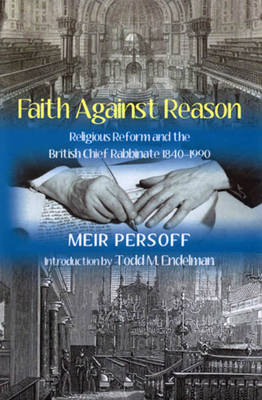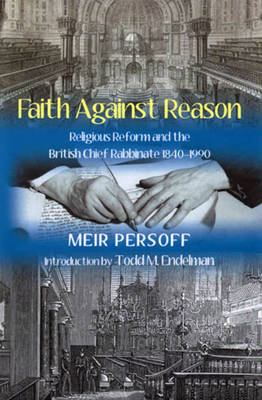
- Afhalen na 1 uur in een winkel met voorraad
- Gratis thuislevering in België vanaf € 30
- Ruim aanbod met 7 miljoen producten
- Afhalen na 1 uur in een winkel met voorraad
- Gratis thuislevering in België vanaf € 30
- Ruim aanbod met 7 miljoen producten
Zoeken
Faith Against Reason
Religious Reform and the British Chief Rabbinate, 1840-1990
Meir Persoff
Hardcover | Engels
€ 122,45
+ 244 punten
Uitvoering
Omschrijving
From the Reform secession of the 1840s and the founding of Liberal Judaism six decades later, to the 'Jacobs Affair' and the rise of Conservative (Masorti) theology towards the end of the twentieth century, the British Chief Rabbinate has faced challenges and controversy on an ever-deepening scale. Using contemporary accounts, broadsides and hitherto unpublished archival material, Faith Against Reason is an incisive and indispensable contribution to an understanding of the fissures and fragmentation besetting Anglo-Jewry in modern times. At its core are the mavericks, ministers, grandees and God-fearers who grappled with the currents and complexities of the hour - and with each other - in their pursuit of communal power and pulpit supremacy. The chroniclers of Anglo-Jewry have not always been kind to Britain's Chief Rabbis. In truth, the verdicts have been mixed, and sometimes muted, but, with communal censure and strife continuing unabated, they have become increasingly forthright as the centuries have turned. In Faith Against Reason, some of these verdicts are subjected to scrutiny; others emerge and, with them, a clearer picture of the Chief Rabbinical stance on religious pluralism.
Specificaties
Betrokkenen
- Auteur(s):
- Uitgeverij:
Inhoud
- Aantal bladzijden:
- 476
- Taal:
- Engels
Eigenschappen
- Productcode (EAN):
- 9780853036791
- Verschijningsdatum:
- 1/09/2008
- Uitvoering:
- Hardcover
- Formaat:
- Genaaid
- Afmetingen:
- 157 mm x 231 mm
- Gewicht:
- 975 g

Alleen bij Standaard Boekhandel
+ 244 punten op je klantenkaart van Standaard Boekhandel
Beoordelingen
We publiceren alleen reviews die voldoen aan de voorwaarden voor reviews. Bekijk onze voorwaarden voor reviews.











